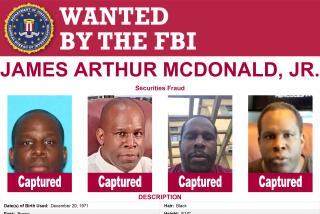NASD Board Recommends $50,000 Fine, Suspension of TV Infomercial Show Host
- Share via
Gene R. Morgan, a Los Angeles underwriter of small stocks who also hosts a daily market-commentary show on Southland TV station KWHY, is facing a $50,000 fine and a six-month suspension for allegedly misrepresenting a stock he underwrote and also promoted on his TV show.
The case, brought by the National Assn. of Securities Dealers, the self-policing organization for brokerages, could have important ramifications for regulation of the mushrooming--and largely unmonitored--investment “infomercial” business.
The decision against Morgan by the NASD’s Los Angeles district business conduct committee was handed down in May but wasn’t made public, because Morgan has appealed it to the NASD’s national business conduct committee. The Times obtained a copy of the district decision this week.
The 70-year-old Morgan has hosted his show on KWHY, which calls itself “The Business Channel,” for 26 years. Morgan’s 30-minute program is called “Charting the Market” and runs Monday through Friday at 1:30 p.m.
Morgan pays for the air time and uses the show to review broad market trends, promote investment seminars offered by his firm and others, and promote individual stocks that he also may underwrite for fee income.
Gene Morgan Financial, his brokerage, was formed in 1984 and has underwritten a number of so-called emerging-growth stocks, some of them highly controversial. In June, 1991, for example, Morgan sponsored a stock offering by Spectrum Information Technologies Inc., a wireless communications company whose shares have since crashed amid allegations of fraud.
The NASD case against Morgan involves a Utah-based developer of giant-screen theaters called International Tourist Entertainment Corp., which Morgan’s brokerage underwrote in December, 1992.
Responding to a complaint, NASD compliance officials reviewed tapes of Morgan’s TV show from Oct. 20-30, 1992. The NASD district committee found that Morgan failed “to provide a sound basis for the public to evaluate ITEC and (made) communications . . . that contained untrue statements of material facts or were otherwise exaggerated, false or misleading.”
In particular, the NASD said Morgan’s TV comments did not present ITEC for what it was: a development-stage firm whose securities were “highly risky,” as was noted in the stock offering prospectus Morgan helped to prepare.
In one of his shows, the NASD said, “Morgan stated without qualification that ‘ITEC’s attraction is a solid financial transaction (sic) appropriate for all types of accounts. Pension and profit-sharing, widows and orphans, and literally anyone who wants to experience enhancement of capital.’ ”
Discussing ITEC, Morgan also told viewers that “seldom do we ever see a transaction that has the prospects of real bottom-line net profits in the first full year of business operation,” and he urged them to “get their money in.” The prospectus, however, noted that ITEC might not have significant revenue for 12 to 15 months.
In fact, ITEC, which now has one theater open (in Branson, Mo.) claims that it was profitable for the first time in July, though its latest financial statements have not yet been filed.
Morgan did not return phone calls, but his Dallas-based attorney, Arthur F. Selander, said his client would appeal the case to federal court if necessary. Selander said Morgan contests the NASD decision “as it relates to the technical kind of violations” alleged, though the complaint states that “most of the facts underlying the violations (have been) admitted” by Morgan.
Selander contends that the dispute is “solely between the NASD and Gene Morgan Financial. No investors have complained” about the way ITEC stock was pitched, he said. He noted that investors had to get a prospectus--and, at least in theory, read it--before they could buy the stock.
“ITEC has been a very successful investment,” Selander said. The initial offering, which consisted of a unit containing one ITEC share and one warrant, was sold at $5 each. The last Nasdaq trade in the units was on July 26, at $7.
For the NASD and state and federal securities watchdogs, the Morgan case may be used to send a message about greater regulatory oversight of the booming investment infomercial business on TV and radio. Even with usual disclaimers that remind viewers and listeners that the show host is being paid to promote a particular investment, regulators fear that the public often may not get the message, and may stumble into unsuitable investments.
And with future TV technology promising a virtually limitless number of channels, “there is a lot of air time (coming) for infomercials,” said Scott Stapf, investment education adviser to the North American Securities Administrators Assn. in Arlington, Va. Even now, policing the airwaves is difficult for strapped regulators, Stapf said, and paid stock promoters can seek shelter behind a heavy shield: the First Amendment.
For its part, KWHY notes that Morgan’s show runs with a disclaimer at the beginning and end, and that on-screen type shows up periodically during the show noting that it is a paid commercial program. Even so, sales manager Linda Miller said that “we have asked Mr. Morgan to get away from” promoting individual stocks and focus on broad market trends, though he has not yet indicated he will permanently make that shift, she said.
More to Read
Inside the business of entertainment
The Wide Shot brings you news, analysis and insights on everything from streaming wars to production — and what it all means for the future.
You may occasionally receive promotional content from the Los Angeles Times.










